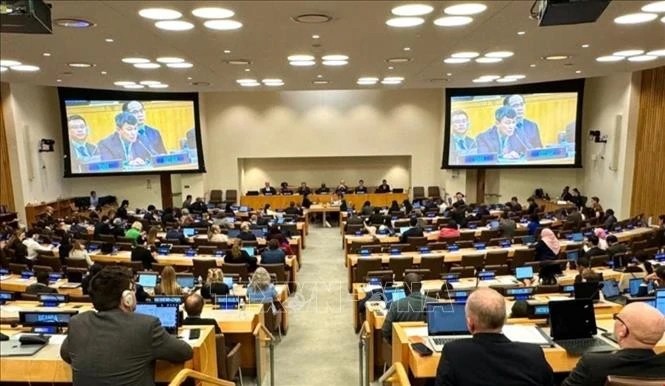UN Agreement on Biodiversity Beyond National Jurisdiction: New Milestone of International Law
| Vietnam Supports UNGA Reform Towards Improved Efficiency and Transparency | |
| Vietnam Ready to Cooperate with UN to Implement Global, Comprehensive, and Inclusive Solutions |
Historical milestone
Extending beyond the 200-nautical mile exclusive economic zone, the high seas, which are not under the jurisdiction of any single nation, cover two-thirds of the Earth's oceans and nearly half of the planet's surface. These vast expanses are rich in diverse biological and non-biological resources, offering immense benefits to humanity.
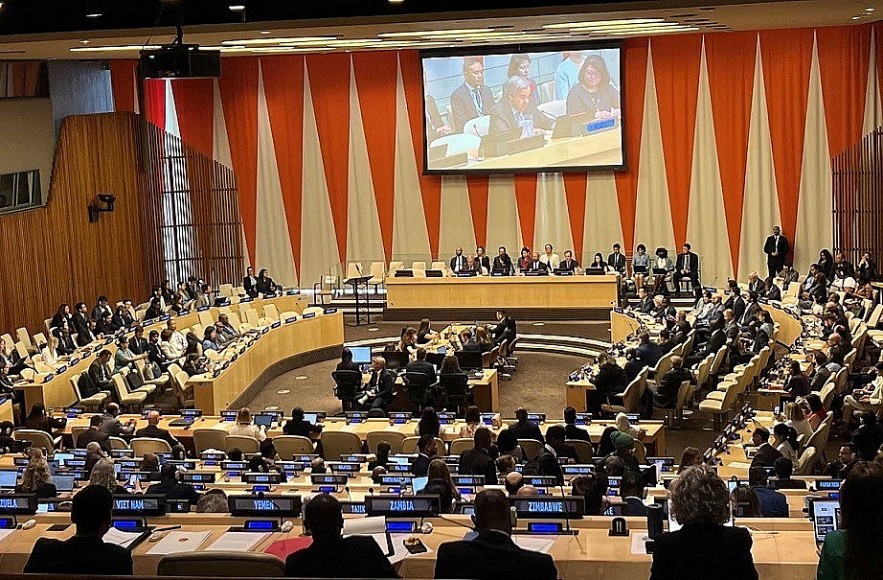 |
| The intergovernmental conference adopted the Agreement under the framework of UNCLOS on the conservation and sustainable use of marine biological diversity in areas beyond national jurisdiction (BBNJ Agreement) on September 16, 2023. Photo: Vietnamese Delegation to the UN |
| Australian Ambassador to Vietnam Andrew Goledzinowski said "The adoption of the Biodiversity Beyond National Jurisdiction (BBNJ) Agreement last year demonstrated the international community's ability to supplement rather than undermine UNCLOS. That is a significant difference." |
The high seas play a critical role in global transportation and shipping and the economic development of nations, regions, and the world at large, contributing to the sustainable development of coastal communities.
However, much of the high seas remains unexplored. Only a handful of countries and organizations with advanced science and technology can explore these remote and deep waters.
The 1982 United Nations Convention on the Law of the Sea (UNCLOS), often referred to as the "Constitution of the Seas," establishes rules of law relating to the use of the world's oceans, including rights of navigation, fishing, and scientific research. However, UNCLOS does not contain specific provisions regarding access to, use, and benefit-sharing of marine genetic resources beyond areas of national jurisdiction, nor does it establish mechanisms to regulate and control activities at sea to protect genetic resources from depletion.
Recognizing the urgency and importance of conserving and sustainably using marine biodiversity in areas beyond national jurisdiction, the international community has been working collectively to address the growing threats posed by marine environmental degradation, and the impacts of climate change on oceans.
On August 1, 2023, the UN General Assembly adopted the BBNJ Agreement by a vote of 150 in favor out of 193 member states. The Agreement was opened for signature on September 20, 2023, and will enter into force 120 days after it has been ratified, accepted, approved, or acceded to by at least 60 States Parties.
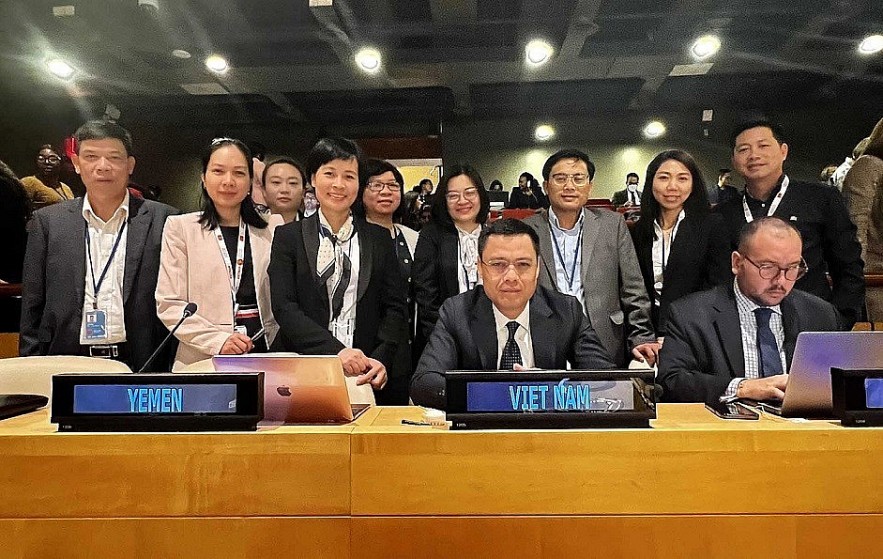 |
| Vietnam's interdisciplinary delegation attended the Intergovernmental Conference through BBNJ. Photo: Vietnam Mission to the UN |
Strengthening the vitality of multilateralism
The BBNJ Agreement is the third agreement to implement UNCLOS, further strengthening UNCLOS as the comprehensive legal framework for all activities at sea.
In addition, the BBNJ Agreement contributes to reinforcing multilateralism, marking a new milestone in the development of international law. It also supports the implementation of the UN Decade of Ocean Science for Sustainable Development and contributes to achieving SDG 14 on the conservation and sustainable use of oceans, seas, and marine resources for sustainable development.
UN Secretary-General Antonio Guterres emphasized that the negotiation and adoption of the BBNJ Agreement demonstrates the power of multilateralism, built on the spirit of UNCLOS, reflecting a commitment to addressing global challenges, and ensuring sustainability in areas beyond national jurisdiction.
Furthermore, the BBNJ Agreement promises to open new doors for international cooperation in fields requiring high scientific and technological capabilities, such as marine genetic resources, area-based management tools, environmental impact assessments, capacity building, and the transfer of marine technology.
Vietnam's significant contribution
As a maritime nation, Vietnam has actively participated in the BBNJ negotiation process from the very beginning, putting forward proposals, making substantive contributions, and being among the first countries to sign the BBNJ Agreement on its opening day.
In a statement to the press, Ambassador Dang Hoang Giang, head of the Vietnamese Delegation to the UN, emphasized Vietnam’s aspiration to "become a strong, sustainable, prosperous, and safe maritime nation, actively and responsibly engaging in addressing international and regional issues concerning seas and oceans."
Therefore, according to Ambassador Dang Hoang Giang, Vietnam seeks to leverage capacity-building measures, technology transfer, and financial resources from the benefit-sharing fund of marine genetic resources beyond national jurisdiction to "access and fully utilize advanced scientific and technological achievements," "train and develop marine human resources, and build a team of highly qualified marine science and technology experts." This effort aligns with the goals of sustainably developing the marine economy based on green growth and biodiversity conservation, as outlined in Vietnam’s Strategy for Sustainable Development of the Marine Economy to 2030, with a Vision to 2045.
Giang emphasized that with the correct maritime and international integration policies of the Party and State, and under the guiding principle of "proactive and active deep integration," as "a friend, a reliable partner, and a responsible member of the international community," Vietnam will increasingly participate in activities in areas beyond national jurisdiction, in Southeast Asia, and other regions around the world.
| The BBNJ Agreement, consisting of a Preamble, 12 Parts, 76 Articles, and two Annexes, aims to ensure the conservation and sustainable use of marine biodiversity for present and future generations through the effective implementation of UNCLOS 1982 and enhanced international cooperation. The BBNJ Agreement addresses four key areas for conserving marine biodiversity: marine genetic resources, area-based management tools (ABMTs) including marine protected areas (MPAs), environmental impact assessments (EIAs), capacity-building and technology transfer. |
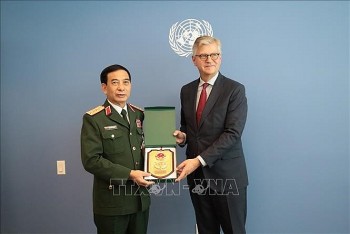 | United Nations Honors Vietnam's Peacekeeping Efforts United Nations Under-Secretary-General for Peace Operations Jean-Pierre Lacroix appreciated Vietnam's effective participation in UN peacekeeping operations. The capacity, qualifications, professionalism and sense of responsibility of ... |
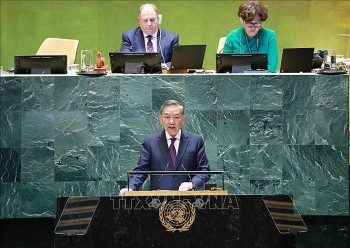 | Strengthening Ties: From New York to Havana President To Lam and his delegation attended a UN meeting in New York City, USA, ending their extensive diplomatic journey with a speech about Vietnam's ... |
Recommended
 Seas and islands
Seas and islands
Vietnam Endorses Common Voice on Ocean Jurisdiction
 Seas and islands
Seas and islands
Dialogue as Key to Settling Disputes and Advancing Law of the Sea
 Seas and islands
Seas and islands
RoK Navy Ship Pays Friendly Visit to Da Nang City
 Seas and islands
Seas and islands
Naval Region 5 Promotes Reading Culture, Fosters Patriotism
Popular article
 Seas and islands
Seas and islands
Coast Guard Region 2 Command Hosts Philippine Coast Counterpart
 Seas and islands
Seas and islands
Vietnam - Thailand Navy: Coordination to Well Address Problems at Sea
 Seas and islands
Seas and islands
Honoring the Fallen: Incense Offering for the 37th Anniversary of Gac Ma
 Seas and islands
Seas and islands





